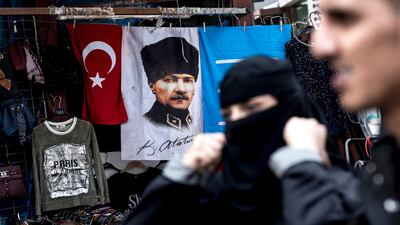President Recep Tayyip Erdogan called for early elections on Wednesday, in a bid to consolidate his hold on power before an expected economic downturn.
Presidential and parliamentary polls were due to take place in November 2019 but Mr Erdogan announced the vote would be held instead on 24 June.
The announcement came a day after Devlet Bahceli, leader of the Nationalist Action Party (MHP), which has formed an electoral alliance with Mr Erdogan’s Justice and Development Party (AKP), called for summer elections.
The president cited “diseases of the old system” and developments in Syria and elsewhere as reasons to hold early elections.
If Mr Erdogan receives 51 per cent of the vote, he will secure executive powers narrowly passed in a referendum last year.
“In a period when developments in Syria accelerated and we have to take very important decisions, from macroeconomic equilibrium to large investments, the election issue should be removed from the agenda as soon as possible,” he told a news conference at the presidential palace in Ankara.
__________________
Read more:
Turkey's state of emergency extended despite 'suffering' caused by human-rights abuses
Turks suffer in limbo as government extends state of emergency
Turkey distances itself from Iran, Russia and US on Syria
__________________
High growth – 7.3 per cent in the last quarter of 2017 – coupled with a 10.2 per cent rate of inflation have led to concerns that the economy is overheating. The lira fell to record lows against the dollar and euro last week while unemployment remains in double digits.
Early elections come despite the government repeatedly dismissing the idea.
However, Mr Erdogan may have decided that early polls would secure the greatest chance of success for the AKP-MHP alliance given the worsening economy on the horizon.
“As economic uncertainties linger, political risks could grow too,” Murat Yetkin, a columnist for Hurriyet newspaper, said. “After all, it was a major economic crisis in 2001 that caused the coalition that the MHP was part of to collapse, carrying the AK Party to power in 2002.”
Murat Yildiz, a former parliamentary adviser for the MHP, added that a summer election would come as the economy is buoyed by tourism.
“Tourists spend a lot of money and many people work in the industry or in sectors providing goods and services to the industry,” he said. “Fruit and vegetables are cheaper and there is a lot of money circulating that provides temporary jobs. Also people don’t have the costs of winter such as heating and schools fees.
“They are trying to avoid the coming economic collapse. And remember, the AKP didn’t come to power because of ideology but due to financial crisis.”
Opinion polls show Mr Erdogan at around 40 per cent support – not enough to secure a second presidential term.
However, Timothy Ash, a senior emerging markets strategist in London, described the development as an astute political move.
“Tony Blair used to be called Teflon Tony but Erdogan’s political senses make him Teflon Tayyip, devastating political move,” he said. “He just made a difficult election for the opposition much harder.”
An early vote will give the government greater scope to capitalise on nationalist sentiment following a successful military operation in Syria that saw Turkey oust Kurdish militants from the Afrin region.
Mr Yetkin said the Afrin campaign, which ended in March, had “caused a rise in nationalist and populist feelings in Turkey, leading to a rise in the potential of both the AK Party and the MHP.”
He added: “Any fading of the ‘Afrin effect’ could cause a drop in the combined potential of the allied parties.”
Another advantage to a June date is that it would seemingly bar the nationalist Good Party from standing. Under electoral regulations, a party must have held its first national congress at least six months prior to an election.
The party, largely made up of former MHP members disillusioned with Mr Bahceli, held its first national congress on April 1 but party officials said an earlier congress held in December qualified it to stand.
The election declaration came as parliament extended for another three months the state of emergency imposed following an attempted coup in July 2016.
In addition, recent changes to election law have heightened fears for fairness. Government critics say the amendments will allow ballot boxes to be removed from opposition strongholds and unstamped ballots to be counted, a practice that caused controversy in last year’s referendum.
_______________
Read more:

